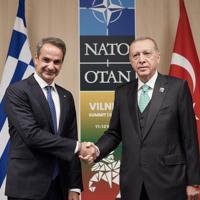ANKARA
President Recep Tayyip Erdoğan expressed optimism about the future of Turkey’s bilateral relations with Greeceaffirming that there are no insurmountable problems between the two neighbors.
“Greece is our neighbor and we will continue to be. We have a common geography and share the same sea. We breathe the same air. We are interconnected by our past,” Erdoğan told Greek daily Kathimerini in an exclusive interview before his visit to Athens is scheduled for December 7.
Acknowledging unresolved issues, Erdoğan stressed that the key to fostering harmony lies in the hands of the two nations. “A ‘new page’ in bilateral relations and a ‘win-win’ principle are intrinsic to Turkey’s approach to international relations and diplomacy,” he said.
During his visit to meet Greek Prime Minister Kyriakos Mitsotakis, the two leaders are expected to sign the “Declaration of Friendly Relations and Good-neighborly Cooperation”, formalizing the common intention to restore ties.
“I often emphasize our belief that all problems with our neighbors, especially Greece, can be overcome,” Erdoğan reportedly said, while indicating a change in Greek outlook.
Addressing Mitsotakis directly, Erdoğan proposed: “My friend Kyriakos, we will not threaten you, if you do not threaten us. Let us strengthen trust between our countries. Let us strengthen our cooperation in all sectors – in the economy, trade, transport, energy, health, technology, education and youth.
The proposed collaboration extends beyond bilateral issues, with Erdoğan emphasizing the need for joint efforts to address challenges such as illegal immigration, issues related to the Turkish minority in Greece and disputes over the Aegean Sea.
By ironing out their differences through dialogue and finding common ground, the two nations can reap the benefits, according to Erdoğan.
Recent positive gestures from both sides have paved the way for upcoming talks, marking a break from long-standing tensions rooted in territorial disputes, differences in maritime borders and divergent political ideologies.
The thaw in relations accelerated after Greece’s rapid response to devastating earthquakes in southeastern Turkey in February, where it sent rescue teams and aid. Solidarity between the two nations has strengthened after a tragic train crash in northern Greece, with Ankara expressing condolences and providing aid.
On the topic of migration, Erdoğan stressed the need for collective efforts, involving not only Turkey and Greece, but also the entire international community.
“As we have always said, this situation is not a problem that countries can solve alone. After all, illegal immigration is a common challenge that requires collective efforts,” Erdoğan said.
“This collaboration must extend beyond Turkey and Greece or migratory movements in the Aegean Sea, it requires a comprehensive and comprehensive effort involving the entire international community.”
Responding to the question of whether Turkey and Greece can agree on referring the continental shelf issue to the International Court of Justice, Erdoğan argued for a comprehensive position.
“There are many interconnected issues that need to be resolved beyond the continental shelf. We need to address them comprehensively. A selective approach would be a mistake. We cannot focus on some issues while neglecting others,” the president said.
Addressing differences with Western countries over the war in Gaza, particularly with NATO allies, Erdoğan positioned Turkey’s foreign policy as being “on the right side of history.”
“Turkey’s response to the unjust and inhumane treatment of the Palestinian people, coupled with our willingness to criticize Israel for its actions that blatantly contravene international law, humanitarian law and human rights, is an essential aspect of our commitment to this goal,” he said.
Given that many Western countries are adopting increasingly similar positions, Erdoğan said, Turkey’s fulfillment of this moral obligation regarding the Palestinian issue raises no doubt about whether it belongs to the West or not.
“Rather than questioning Turkey’s direction and position, the focus should be on cases in which some Western countries might neglect the values they strongly uphold,” he concluded.


